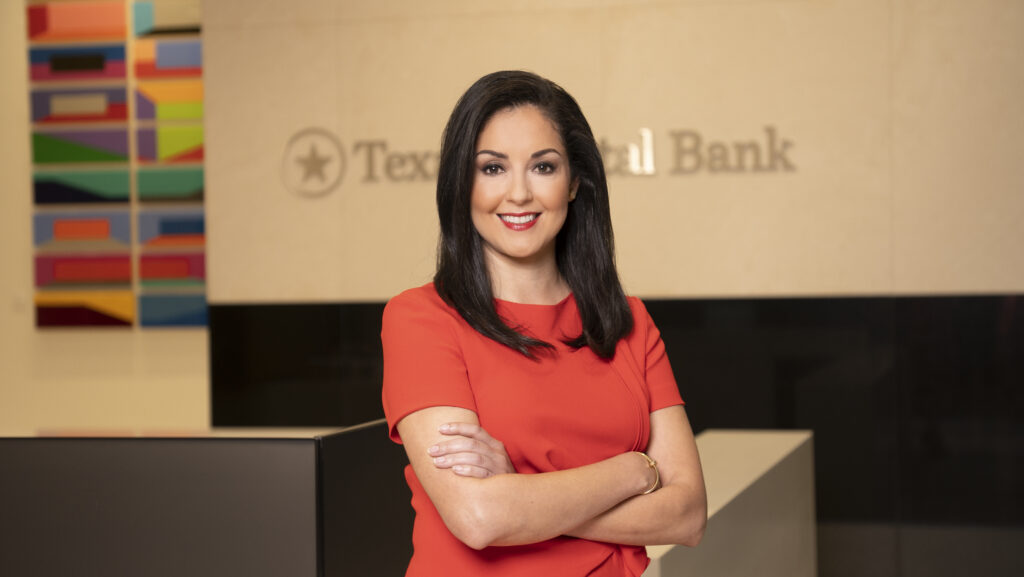
Anna Alvarado
Anna Alvarado, the general counsel of Dallas-based Texas Capital Bank, had humble beginnings: Picking grapes with her parents, who were immigrant farmworkers in California. But she has played an important part in the bank’s transformation. Last month, it closed its $3.4 billion sale of insurance premium finance unit BankDirect Capital Finance to a subsidiary of Truist Financial Corp., enabling it to re-focus its capital and expenses in line with its strategy of creating the state’s flagship full-service financial services firm. Alvarado talks about that transaction as well as the beginning of her legal career, trends she sees in banking and what a potential recession will do to the industry.
What were your parents’ professions?
Farmworkers. They immigrated from Mexico to the San Joaquin Valley (central California) to pick grapes and other fruits and vegetables grown in that region. Picking grapes was my first job.
How did you begin your career?
I started my professional working career while in college, at Bentley University, where I was a working as an accountant for a small software technology company.
And how did you begin your legal career, including law firm work for Hill Gilstrap?
After a few years working as an accountant in southern California, I knew it was time to go to law school, and the only school I applied to was SMU because I wanted to move back to Texas to be closer to my mom. When I moved, I had a choice of working as accountant or go all in, and start from the bottom as a law clerk for a law firm. I “cold” walked into the law firm of Hill Gilstrap – not knowing anyone except that it had a reputation for being one of the best trial firms in DFW – and was hired that day. I just walked in and asked the founding partner for a job knowing I had no legal experience whatsoever.
What was your in-house experience at FirstCash like?
It was great and memorable [and] required a lot of travel to Latin America. I learned how to be a corporate athlete. I had the opportunity to lead and help grow the company significantly. It allowed me to utilize my legal and business skills and leverage my Spanish speaking skills and knowledge of culture.
What prompted the sale of BankDirect?
It didn’t fit with the long-term strategy of Texas Capital Bank.
Why did you use Cravath on the deal?
They are excellent partners and great at what they do. They go above and beyond when working on a project. They are available, responsive and fast.
Any challenges in getting the deal done?
All deals have their own unique challenges. The main challenge in this deal was getting regulatory approval timely, which risked the deal not closing.
What trends are you now seeing in banking? What does that tell you about the current state of business and the economy?
Liquidity is tight and capital is getting harder and harder to obtain. At [the] minimum, the cost of capital will only continue to increase for the foreseeable future. I think we haven’t yet seen the “bottom” and the overall economic outlook is bleak. Banks have stopped lending and I think that trend will continue.
What do you think an economic contraction will do to the banking industry?
There will be winners and losers. Bigger banks will find ways to get smaller or divest, smaller banks will struggle if they don’t have strong operating deposits or keep them. It will be a race to the bottom as banks will fight for those deposits that may be more costly in the end, or short lived and unsustainable. Fortunately, for Texas Capital Bank, its capital structure and balance sheet are the strongest they have ever been in the history of the bank. We will continue to focus on being discerning and banking the best clients in Texas since we have the capital and wherewithal to weather this ever changing economic landscape alongside our clients.
How has the practice of law changed during your career?
It’s changed in the sense lawyers are expected to be more than lawyers and more strategic partners who not only problem solve but can get things done. I think great lawyers have always done this.
How has the Texas legal climate changed? Do you think it will evolve further, and if so, how?
I don’t think the Texas legal climate has changed all that much. That’s not to say that Texas doesn’t increase its regulations, yearly, but overall, it’s generally stable and business friendly. I don’t see that changing anytime soon.
What are your proudest achievements?
Passing the Texas Bar.
Your most profound disappointments?
I’ll tell you over a cocktail.
